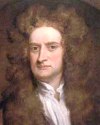 (source)
(source)
|
Sir Isaac Newton
(25 Dec 1642 - 20 Mar 1727)
English physicist and mathematician who made seminal discoveries in several areas of science, and was the leading scientist of his era.
|
Sir Isaac Newton Quotes on Principle (13 quotes)
>> Click for 109 Science Quotes by Sir Isaac Newton
>> Click for Sir Isaac Newton Quotes on | Action | Attraction | Body | Cause | Color | Colour | Effect | Experiment | Explanation | Force | God | Gravity | Heat | Hypothesis | Law Of Motion | Light | Matter | Motion | Nature | Orbit | Particle | Phenomenon | Philosophy | Planet | Proportion | Ray | Sun | Truth |
>> Click for 109 Science Quotes by Sir Isaac Newton
>> Click for Sir Isaac Newton Quotes on | Action | Attraction | Body | Cause | Color | Colour | Effect | Experiment | Explanation | Force | God | Gravity | Heat | Hypothesis | Law Of Motion | Light | Matter | Motion | Nature | Orbit | Particle | Phenomenon | Philosophy | Planet | Proportion | Ray | Sun | Truth |
…from the same principles, I now demonstrate the frame of the System of the World.
— Sir Isaac Newton
From Principia Mathematica, Book 3, as translated from the Latin by Andrew Motte, revised by William Davis, in The Mathematical Principles of Natural Philosophy (1803), Vol. 2, 159.
And for rejecting such a Medium, we have the Authority of those the oldest and most celebrated Philosophers of Greece and Phoenicia, who made a Vacuum, and Atoms, and the Gravity of Atoms, the first Principles of their Philosophy; tacitly attributing Gravity to some other Cause than dense Matter. Later Philosophers banish the Consideration of such a Cause out of natural Philosophy, feigning Hypotheses for explaining all things mechanically, and referring other Causes to Metaphysicks: Whereas the main Business of natural Philosophy is to argue from Phaenomena without feigning Hypotheses, and to deduce Causes from Effects, till we come to the very first Cause, which certainly is not mechanical; and not only to unfold the Mechanism of the World, but chiefly to resolve these and such like Questions. What is there in places almost empty of Matter, and whence is it that the Sun and Planets gravitate towards one another, without dense Matter between them? Whence is it that Nature doth nothing in vain; and whence arises all that Order and Beauty which we see in the World? ... does it not appear from phaenomena that there is a Being incorporeal, living, intelligent, omnipresent, who in infinite space, as it were in his Sensory, sees the things themselves intimately, and thoroughly perceives them, and comprehends them wholly by their immediate presence to himself.
— Sir Isaac Newton
In Opticks, (1704, 2nd. Ed. 1718), Book 3, Query 28, 343-5. Newton’s reference to “Nature does nothing in vain” recalls the axiom from Aristotle, which may be seen as “Natura nihil agit frustra” in the Aristotle Quotes on this web site.
And if one look through a Prism upon a white Object encompassed with blackness or darkness, the reason of the Colours arising on the edges is much the same, as will appear to one that shall a little consider it. If a black Object be encompassed with a white one, the Colours which appear through the Prism are to be derived from the Light of the white one, spreading into the Regions of the black, and therefore they appear in a contrary order to that, when a white Object is surrounded with black. And the same is to be understood when an Object is viewed, whose parts are some of them less luminous than others. For in the borders of the more and less luminous Parts, Colours ought always by the same Principles to arise from the Excess of the Light of the more luminous, and to be of the same kind as if the darker parts were black, but yet to be more faint and dilute.
— Sir Isaac Newton
Opticks (1704), Book I, Part 2, Prop. VIII, Prob. III, 123.
And thus Nature will be very conformable to her self and very simple, performing all the great Motions of the heavenly Bodies by the Attraction of Gravity which intercedes those Bodies, and almost all the small ones of their Particles by some other attractive and repelling Powers which intercede the Particles. The Vis inertiae is a passive Principle by which Bodies persist in their Motion or Rest, receive Motion in proportion to the Force impressing it, and resist as much as they are resisted. By this Principle alone there never could have been any Motion in the World. Some other Principle was necessary for putting Bodies into Motion; and now they are in Motion, some other Principle is necessary for conserving the Motion.
— Sir Isaac Newton
From Opticks, (1704, 2nd ed. 1718), Book 3, Query 31, 372-3.
For nature is a perpetuall circulatory worker, generating fluids out of solids, and solids out of fluids, fixed things out of volatile, & volatile out of fixed, subtile out of gross, & gross out of subtile, Some things to ascend & make the upper terrestriall juices, Rivers and the Atmosphere; & by consequence others to descend for a Requitall to the former. And as the Earth, so perhaps may the Sun imbibe this spirit copiously to conserve his Shineing, & keep the Planets from recedeing further from him. And they that will, may also suppose, that this Spirit affords or carryes with it thither the solary fewell & materiall Principle of Light; And that the vast aethereall Spaces between us, & the stars are for a sufficient repository for this food of the Sunn and Planets.
— Sir Isaac Newton
Letter to Oldenburg (7 Dec 1675). In H. W. Turnbull (ed.), The Correspondence of Isaac Newton, 1661-1675 (1959), Vol. 1, 366.
From this fountain (the free will of God) it is those laws, which we call the laws of nature, have flowed, in which there appear many traces of the most wise contrivance, but not the least shadow of necessity. These therefore we must not seek from uncertain conjectures, but learn them from observations and experimental. He who is presumptuous enough to think that he can find the true principles of physics and the laws of natural things by the force alone of his own mind, and the internal light of his reason, must either suppose the world exists by necessity, and by the same necessity follows the law proposed; or if the order of Nature was established by the will of God, the [man] himself, a miserable reptile, can tell what was fittest to be done.
— Sir Isaac Newton
…...
I have presented principles of philosophy that are not, however, philosophical but strictly mathematical—that is, those on which the study of philosophy can be based. These principles are the laws and conditions of motions and of forces, which especially relate to philosophy.
— Sir Isaac Newton
... It still remains for us to exhibit system of the world from these same principles.
It seems to me farther, that these Particles have not only a Vis inertiae, accompanied with such passive Laws of Motion as naturally result from that Force, but also that they are moved by certain active Principles, such as that of Gravity, and that which causes Fermentation, and the Cohesion of Bodies. These Principles I consider, not as occult Qualities, supposed to result from the specifick Forms of Things, but as general Laws of Nature, by which the Things themselves are form'd; their Truth appearing to us by Phaenomena, though their Causes be not yet discover'd. For these are manifest Qualities, and their Causes only are occult.
— Sir Isaac Newton
From Opticks, (1704, 2nd ed. 1718), Book 3, Query 31, 376-377.
Now if Light be reflected, not by impinging on the solid parts of Bodies, but by some other principle; it's probable that as many of its Rays as impinge on the solid parts of Bodies are not reflected but stifled and lost in the Bodies. For otherwise we must allow two sorts of Reflexions. Should all the Rays be reflected which impinge on the internal parts of clear Water or Crystal, those Substances would rather have a cloudy Colour than a clear Transparency. To make Bodies look black, it's necessary that many Rays be stopp'd, retained, and lost in them; and it seems not probable that any Rays can be stopp'd and stifled in them which do not impinge on their parts.
— Sir Isaac Newton
Opticks (1704), Book 2, Part 3, Prop. VIII, 69.
Our present work sets forth mathematical principles of philosophy. For the basic problem of philosophy seems to be to discover the forces of nature from the phenomena of motions and then to demonstrate the other phenomena from these forces. It is to these ends that the general propositions in books 1 and 2 are directed, while in book 3 our explanation of the system of the world illustrates these propositions.
— Sir Isaac Newton
The Principia: Mathematical Principles of Natural Philosophy (1687), 3rd edition (1726), trans. I. Bernard Cohen and Anne Whitman (1999), Preface to the first edition, 382.
Seeing therefore the variety of Motion which we find in the World is always decreasing, there is a necessity of conserving and recruiting it by active Principles, such as are the cause of Gravity, by which Planets and Comets keep their Motions in their Orbs, and Bodies acquire great Motion in falling; and the cause of Fermentation, by which the Heart and Blood of Animals are kept in perpetual Motion and Heat; the inward Parts of the Earth are constantly warm'd, and in some places grow very hot; Bodies burn and shine, Mountains take fire, the Caverns of the Earth are blown up, and the Sun continues violently hot and lucid, and warms all things by his Light. For we meet with very little Motion in the World, besides what is owing to these active Principles.
— Sir Isaac Newton
From Opticks, (1704, 2nd ed. 1718), Book 3, Query 31, 375.
The Synthesis consists in assuming the Causes discovered and established as Principles, and by them explaining the Phænomena proceeding from them, and proving the Explanations.
— Sir Isaac Newton
From 'Query 31', Opticks (1704, 2nd ed., 1718), 380-381.
To derive two or three general Principles of Motion from Phænomena, and afterwards to tell us how the Properties and Actions of all corporeal Things follow from those manifest Principles, would be a very great step in Philosophy.
— Sir Isaac Newton
From 'Query 31', Opticks (1704, 2nd ed., 1718), 377.
See also:
- 25 Dec - short biography, births, deaths and events on date of Newton's birth.
- Isaac Newton - Comments on his “Playing on the Seashore” Quote
- Isaac Newton - “Playing on the Seashore” illustrated quote - Medium 500px.
- Isaac Newton - “Playing on the Seashore” illustrated quote - Large 800px.
- Isaac Newton - context of quote “A change in motion” - Medium image (500 x 250 px)
- Isaac Newton - context of quote “A change in motion” - Large image (800 x 400 px)
- Isaac Newton - context of quote “In experimental philosophy” - Medium image (500 x 250 px)
- Isaac Newton - context of quote “In experimental philosophy” - Large image (800 x 400 px)
- Isaac Newton - context of quote “Standing on the shoulders of giants” - Medium image (500 x 250 px)
- Isaac Newton - context of quote “Standing on the shoulders of giants” - Large image (800 x 400 px)
- Isaac Newton - context of quote “Impressed force is the action” - Medium image (500 x 250 px)
- Isaac Newton - context of quote “Impressed force is the action” - Large image (800 x 400 px)
- Isaac Newton - context of quote “Inherent force of matter is the power of resisting…” - Medium image (500 x 250 px)
- Isaac Newton - context of quote “Inherent force of matter is the power of resisting…” - Large image (800 x 400 px)
- Isaac Newton - context of quote “Plato is my friend” - Medium image (500 x 250 px)
- Isaac Newton - biography from Famous Men of Science (1889)
- Isaac Newton - context of quote “Plato is my friend” - Large image (800 x 400 px)
- Isaac Newton - context of quote “Colours which appear through the Prism ” - Medium image (500 x 250 px)
- Isaac Newton - context of quote “Colours which appear through the Prism ” - Large image (800 x 400 px)
- Isaac Newton - context of quote “Nature does nothing in vain” - Medium image (500 x 250 px)
- Isaac Newton - context of quote “Nature does nothing in vain” - Large image (800 x 400 px)
- Isaac Newton - context of quote “No more causes of natural things should be admitted” - Medium image (500 x 250 px)
- Isaac Newton - context of quote “No more causes of natural things should be admitted” - Large image (800 x 400 px)
- Isaac Newton - context of quote “Truth is ever to be found in simplicity” - Medium image (500 x 250 px)
- Isaac Newton - context of quote “Truth is ever to be found in simplicity” - Large image (800 x 400 px)
- Isaac Newton - context of quote “Every body perseveres in its state of being at rest” - Medium image (500 x 250 px)
- Isaac Newton - context of quote “Every body perseveres in its state of being at rest” - Large image (800 x 400 px)
- Isaac Newton - context of quote “God, in the beginning, formed matter” - Medium image (500 x 250 px)
- Isaac Newton - context of quote “God, in the beginning, formed matter” - Large image (800 x 400 px)
- Isaac Newton - context of quote “The cause of gravity is what I do not pretend to know” - Medium image (500 x 250 px)
- Isaac Newton - context of quote “The cause of gravity is what I do not pretend to know” - Large image (800 x 400 px)
- Sir Isaac Newton’s Apple-Tree - debunking the myth, from Historic Ninepins: A Book of Curiosities by John Timbs (1869)
- Newton and the Dog - debunking the myth about Newton’s dog Diamond.
- Booklist for Isaac Newton.

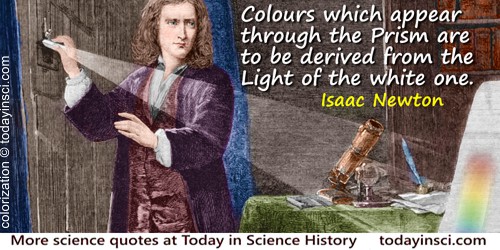
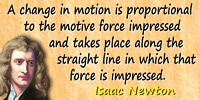
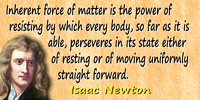
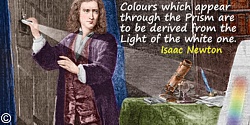
 In science it often happens that scientists say, 'You know that's a really good argument; my position is mistaken,' and then they would actually change their minds and you never hear that old view from them again. They really do it. It doesn't happen as often as it should, because scientists are human and change is sometimes painful. But it happens every day. I cannot recall the last time something like that happened in politics or religion.
(1987) --
In science it often happens that scientists say, 'You know that's a really good argument; my position is mistaken,' and then they would actually change their minds and you never hear that old view from them again. They really do it. It doesn't happen as often as it should, because scientists are human and change is sometimes painful. But it happens every day. I cannot recall the last time something like that happened in politics or religion.
(1987) -- 


